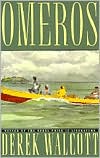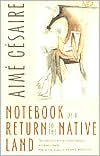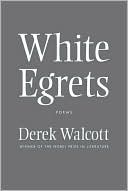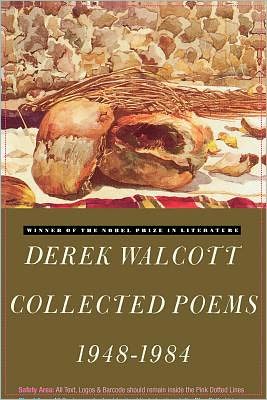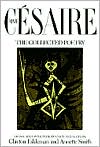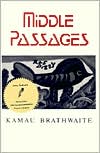Selected Poems
Drawing from every stage of the Nobel laureate's career, Derek Walcott's Selected Poems brings together famous pieces from his early volumes, including "A Far Cry from Africa" and "A City's Death by Fire," with passages from the celebrated Omeros and selections from his latest major works, which extend his contributions to reenergizing the contemporary long poem. Here we find all of Walcott's essential themes, from grappling with the Caribbean's colonial legacy to his conflicted love of home...
Search in google:
Drawing from every stage of the Nobel laureate's career, Derek Walcott's Selected Poems brings together famous pieces from his early volumes, including "A Far Cry from Africa" and "A City's Death by Fire," with passages from the celebrated Omeros and selections from his latest major works, which extend his contributions to reenergizing the contemporary long poem. Here we find all of Walcott's essential themes, from grappling with the Caribbean's colonial legacy to his conflicted love of home and of Western literary tradition; from the wisdom-making pain of time and mortality to the strange wonder of love, the natural world, and what it means to be human. We see his lifelong labor at poetic crafts, his broadening of the possibilities of rhyme and meter, stanza forms, language, and metaphor. Edited and with an introduction by the Jamaican poet and critic Edward Baugh, this volume is a perfect representation of Walcott's breadth of work, spanning almost half a century.The New York Times - William LoganWalcott has captured his islands with a lushness and richness rare in our poetry - the outposts of empire once seemed as strange as Kipling's India or Bishop's Brazil. If air travel has brought them closer, it has brought their tragedies closer as well. No living poet has written verse more delicately rendered or distinguished than Walcott, though few individual poems seem destined to be remembered. For more than half a century he has served as our poet of exile - a man almost without a country, unless the country lies wherever he has landed, in flight from himself.
Selected Poems\ \ By DEREK WALCOTT \ FARRAR, STRAUS AND GIROUX\ Copyright © 2007 Derek Walcott\ All right reserved.\ ISBN: 978-0-374-26066-8 \ \ \ \ Chapter One\ \ PRELUDE \ \ I, with legs crossed along the daylight, watch\ The variegated fists of clouds that gather over\ The uncouth features of this, my prone island.\ \ Meanwhile the steamers which divide horizons prove\ Us lost;\ Found only\ In tourist booklets, behind ardent binoculars;\ Found in the blue reflection of eyes\ That have known cities and think us here happy.\ \ Time creeps over the patient who are too long patient,\ So I, who have made one choice,\ Discover that my boyhood has gone over.\ \ And my life, too early of course for the profound cigarette,\ The turned doorhandle, the knife turning\ In the bowels of the hours, must not be made public\ Until I have learnt to suffer\ In accurate iambics.\ \ I go, of course, through all the isolated acts,\ Make a holiday of situations,\ Straighten my tie and fix important jaws,\ And note the living images\ Of flesh that saunter through the eye.\ \ Until from all I turn to think how,\ In the middle of the journey through my life,\ O how I came upon you, my\ Reluctant leopard of the slow eyes.\ \ AS JOHN TO PATMOS\ \ As John to Patmos, among the rocks and the blue, live air, hounded\ His heart to peace, as here surrounded\ By the strewn-silver on waves, the wood's crude hair, the rounded\ Breasts of the milky bays, palms, flocks, the green and dead\ \ Leaves, the sun's brass coin on my cheek, where\ Canoes brace the sun's strength, as John, in that bleak air,\ So am I welcomed richer by these blue scapes, Greek there,\ So I shall voyage no more from home; may I speak here.\ \ This island is heaven-away from the dustblown blood of cities;\ See the curve of bay, watch the straggling flower, pretty is\ The wing'd sound of trees, the sparse-powdered sky, when lit is\ The night. For beauty has surrounded\ Its black children, and freed them of homeless ditties.\ \ As John to Patmos, in each love-leaping air,\ O slave, soldier, worker under red trees sleeping, hear\ What I swear now, as John did:\ To praise lovelong, the living and the brown dead.\ \ A CITY'S DEATH BY FIRE\ \ After that hot gospeller had levelled all but the churched sky,\ I wrote the tale by tallow of a city's death by fire;\ Under a candle's eye, that smoked in tears, I\ Wanted to tell, in more than wax, of faiths that were snapped like wire.\ All day I walked abroad among the rubbled tales,\ Shocked at each wall that stood on the street like a liar;\ Loud was the bird-rocked sky, and all the clouds were bales\ Torn open by looting, and white, in spite of the fire.\ By the smoking sea, where Christ walked, I asked, why\ Should a man wax tears, when his wooden world fails?\ In town, leaves were paper, but the hills were a flock of faiths;\ To a boy who walked all day, each leaf was a green breath\ Rebuilding a love I thought was dead as nails,\ Blessing the death and the baptism by fire.\ \ A FAR CRY FROM AFRICA\ \ A wind is ruffling the tawny pelt\ Of Africa. Kikuyu, quick as flies,\ Batten upon the bloodstreams of the veldt.\ Corpses are scattered through a paradise.\ Only the worm, colonel of carrion, cries:\ "Waste no compassion on these separate dead!"\ Statistics justify and scholars seize\ The salients of colonial policy.\ What is that to the white child hacked in bed?\ To savages, expendable as Jews?\ \ Threshed out by beaters, the long rushes break\ In a white dust of ibises whose cries\ Have wheeled since civilization's dawn\ From the parched river or beast-teeming plain.\ The violence of beast on beast is read\ As natural law, but upright man\ Seeks his divinity by inflicting pain.\ Delirious as these worried beasts, his wars\ Dance to the tightened carcass of a drum,\ While he calls courage still that native dread\ Of the white peace contracted by the dead.\ \ \ Again brutish necessity wipes its hands\ Upon the napkin of a dirty cause, again\ A waste of our compassion, as with Spain,\ The gorilla wrestles with the superman.\ I who am poisoned with the blood of both,\ Where shall I turn, divided to the vein?\ I who have cursed\ The drunken officer of British rule, how choose\ Between this Africa and the English tongue I love?\ Betray them both, or give back what they give?\ How can I face such slaughter and be cool?\ How can I turn from Africa and live?\ \ RUINS OF A GREAT HOUSE\ \ though our longest sun sets at right declensions and\ makes but winter arches, it cannot be long before we\ lie down in darkness, and have our light in ashes ...\ \ \ \ \ \ \ -BROWNE, Urn Burial\ \ Stones only, the disjecta membra of this Great House,\ Whose moth-like girls are mixed with candledust,\ Remain to file the lizard's dragonish claws.\ The mouths of those gate cherubs shriek with stain;\ Axle and coach wheel silted under the muck\ Of cattle droppings.\ \ \ \ \ Three crows flap for the trees\ And settle, creaking the eucalyptus boughs.\ A smell of dead limes quickens in the nose\ The leprosy of empire.\ \ \ \ \ "Farewell, green fields,\ \ \ \ \ Farewell, ye happy groves!"\ Marble like Greece, like Faulkner's South in stone,\ Deciduous beauty prospered and is gone,\ But where the lawn breaks in a rash of trees\ A spade below dead leaves will ring the bone\ Of some dead animal or human thing\ Fallen from evil days, from evil times.\ \ It seems that the original crops were limes\ Grown in the silt that clogs the river's skirt;\ The imperious rakes are gone, their bright girls gone,\ The river flows, obliterating hurt.\ I climbed a wall with the grille ironwork\ Of exiled craftsmen protecting that great house\ From guilt, perhaps, but not from the worm's rent\ Nor from the padded cavalry of the mouse.\ And when a wind shook in the limes I heard\ What Kipling heard, the death of a great empire, the abuse\ Of ignorance by Bible and by sword.\ \ \ A green lawn, broken by low walls of stone,\ Dipped to the rivulet, and pacing, I thought next\ Of men like Hawkins, Waiter Raleigh, Drake,\ Ancestral murderers and poets, more perplexed\ In memory now by every ulcerous crime.\ The world's green age then was a rotting lime\ Whose stench became the charnel galleon's text.\ The rot remains with us, the men are gone.\ But, as dead ash is lifted in a wind\ That fans the blackening ember of the mind,\ My eyes burned from the ashen prose of Donne.\ \ Ablaze with rage I thought,\ Some slave is rotting in this manorial lake,\ But still the coal of my compassion fought\ That Albion too was once\ A colony like ours, "part of the continent, piece of the main,"\ Nook-shorten, rook o'erblown, deranged\ By foaming channels and the vain expense\ Of bitter faction.\ \ \ \ \ All in compassion ends\ So differently from what the heart arranged:\ "as well as if a manor of thy friend's ..."\ \ TALES OF THE ISLANDS\ \ Chapter I / La rivière dorée ...\ \ The marl white road, the Dorée rushing cool\ Through gorges of green cedars, like the sound\ Of infant voices from the Mission School,\ Like leaves like dim seas in the mind; ici, Choiseul.\ The stone cathedral echoes like a well,\ Or as a sunken sea-cave, carved, in sand.\ Touring its Via Dolorosa I tried to keep\ That chill flesh from my memory when I found\ A Sancta Teresa in her nest of light;\ The skirts of fluttered bronze, the uplifted hand,\ The cherub, shaft upraised, parting her breast.\ Teach our philosophy the strength to reach\ Above the navel; black bodies, wet with light,\ Rolled in the spray as I strolled up the beach.\ \ Chapter II / "Qu'un sang impur ..."\ \ Cosimo de Chrétien controlled a boardinghouse.\ His maman managed him. No. 13.\ Rue St. Louis. It had a court, with rails,\ A perroquet, a curio shop where you\ Saw black dolls and an old French barquentine\ Anchored in glass. Upstairs, the family sword,\ The rusting icon of a withered race,\ Like the first angel's kept its pride of place,\ Reminding the bald count to keep his word\ Never to bring the lineage to disgrace.\ Devouring Time, which blunts the Lion's claws,\ Kept Cosimo, count of curios, fairly chaste,\ For Mama's sake, for hair oil, and for whist;\ Peering from balconies for his tragic twist.\ \ Chapter III / La helle qui fut ...\ \ Miss Rossignol lived in the lazaretto\ For Roman Catholic crones; she had white skin,\ And underneath it, fine, old-fashioned bones;\ She flew like bats to vespers every twilight,\ The living Magdalen of Donatello;\ And tipsy as a bottle when she stalked\ On stilted legs to fetch the morning milk,\ In a black shawl harnessed by rusty brooches.\ My mother warned us how that flesh knew silk\ Coursing a green estate in gilded coaches.\ While Miss Rossignol, in the cathedral loft,\ Sang to her one dead child, a tattered saint\ Whose pride had paupered beauty to this witch\ Who was so fine once, whose hands were so soft.\ \ Chapter IV / "Dance of Death"\ \ Outside I said, "He's a damned epileptic,\ Your boy, El Greco! Goya, he don't lie."\ Doc laughed: "Let's join the real epileptics."\ Two of the girls looked good. The Indian said\ That rain affects the trade. In the queer light\ We all looked green. The beer and all looked green.\ One draped an arm around me like a wreath.\ The next talked politics. "Our mother earth,"\ I said. "The great republic in whose womb\ The dead outvote the quick." "Y'all too obscene,"\ The Indian laughed. "Y'all college boys ain't worth\ The trouble." We entered the bare room.\ In the rain, walking home, was worried, but Doc said:\ "Don't worry, kid, the wages of sin is birth."\ \ Chapter V / "moeurs anciennes"\ \ The fête took place one morning in the heights\ For the approval of some anthropologist.\ The priests objected to such savage rites\ In a Catholic country; but there was a twist\ As one of the fathers was himself a student\ Of black customs; it was quite ironic.\ They lead sheep to the rivulet with a drum,\ Dancing with absolutely natural grace\ Remembered from the dark past whence we come.\ The whole thing was more like a bloody picnic.\ Bottles of white rum and a brawling booth.\ They tie the lamb up, then chop off the head,\ And ritualists take turns drinking the blood.\ Great stuff, old boy; sacrifice, moments of truth.\ \ Chapter VI\ \ Poopa, da' was a fête! I mean it had\ Free rum free whisky and some fellars beating\ Pan from one of them band in Trinidad,\ And everywhere you turn was people eating\ And drinking and don't name me but I think\ They catch his wife with two tests up the beach\ While he drunk quoting Shelley with "Each\ Generation has its angst, but we has none"\ And wouldn't let a comma in edgewise.\ (Black writer chap, one of them Oxbridge guys.)\ And it was round this part once that the heart\ Of a young child was torn from it alive\ By two practitioners of native art,\ But that was long before this jump and jive.\ \ Chapter VII/Lotus eater ...\ \ "Maingot," the fisherman called that pool blocked by\ Increasing filth that piled between ocean\ And jungle, with a sighing grove\ Of dry bamboo, its roots freckled with light\ Like feathers fallen from a migratory sky.\ Beyond that, the village. Through urine-stunted trees\ A mud path wriggled like a snake in flight.\ Franklin gripped the bridge stanchions with a hand\ Trembling from fever. Each spring, memories\ Of his own country where he could not die\ Assaulted him. He watched the malarial light\ Shiver the canes. In the tea-coloured pool, tadpoles\ Seemed happy in their element. Poor, black souls.\ He shook himself. Must breed, drink, rot with motion.\ \ Chapter VIII\ \ In the Hotel Miranda, 10 Grass St., who fought\ The Falangists en la guerra civil, at the hour\ Of bleeding light and beads of crimson dew,\ This exile, with the wry face of a Jew,\ Lets dust powder his pamphlets; crook't\ Fingers clutch a journal to his shirt.\ The eye is glacial; mountainous, the hook'd\ Nose down which an ant, caballo, rides. Besides,\ As pious fleas explore a seam of dirt,\ The sunwashed body, past the age of sweat,\ Sprawls like a hero, curiously inert.\ Near him a dish of olives has turned sour.\ Above the children's street cries, a girl plays\ A marching song not often sung these days.\ \ \ Chapter IX / "Le loupgarou"\ \ A curious tale that threaded through the town\ Through greying women sewing under eaves,\ Was how his greed had brought old Le Brun down,\ Greeted by slowly shutting jalousies\ When he approached them in white linen suit,\ Pink glasses, cork-hat, and tap-tapping cane,\ A dying man licensed to sell sick fruit,\ Ruined by fiends with whom he'd made a bargain.\ It seems one night, these Christian witches said,\ He changed himself to an Alsatian hound,\ A slavering lycanthrope hot on a scent,\ But his own watchman dealt the thing a wound.\ It howled and lugged its entrails, trailing wet\ With blood, back to its doorstep, almost dead.\ \ Chapter X / "Adieu foulard ..."\ \ I watched the island narrowing the fine\ Writing of foam around the precipices, then\ The roads as small and casual as twine\ Thrown on its mountains; I watched till the plane\ Turned to the final north and turned above\ The open channel with the grey sea between\ The fishermen's islets until all that I love\ Folded in cloud; I watched the shallow green\ That broke in places where there would be reef,\ The silver glinting on the fuselage, each mile\ Dividing us and all fidelity strained\ Till space would snap it. Then, after a while\ I thought of nothing; nothing, I prayed, would change;\ When we set down at Seawell it had rained.\ \ RETURN TO D'ENNERY; RAIN\ \ Imprisoned in these wires of rain, I watch\ This village stricken with a single street,\ Each weathered shack leans on a wooden crutch,\ Contented as a cripple with defeat.\ Five years ago even poverty seemed sweet,\ So azure and indifferent was this air,\ So murmurous of oblivion the sea,\ That any human action seemed a waste,\ The place seemed born for being buried there.\ \ \ \ \ The surf explodes\ In scissor-birds hunting the usual fish,\ The rain is muddying unpaved inland roads,\ So personal grief melts in the general wish.\ \ The hospital is quiet in the rain.\ A naked boy drives pigs into the bush.\ The coast shudders with every surge. The beach\ Admits a beaten heron. Filth and foam.\ There in a belt of emerald light, a sail\ Plunges and lifts between the crests of reef,\ The hills are smoking in the vaporous light,\ The rain seeps slowly to the core of grief.\ It could not change its sorrows and be home.\ \ It cannot change, though you become a man\ Who would exchange compassion for a drink,\ Now you are brought to where manhood began\ Its separation from "the wounds that make you think."\ And as this rain puddles the sand, it sinks\ Old sorrows in the gutter of the mind;\ Where is that passionate hatred that would help\ The black, the despairing, the poor, by speech alone?\ The fury shakes like wet leaves in the wind,\ The rain beats on a brain hardened to stone.\ \ For there is a time in the tide of the heart, when\ Arrived at its anchor of suffering, a grave\ Or a bed, despairing in action, we ask,\ O God, where is our home? For no one will save\ The world from itself, though he walk among men,\ On such shores where the foam\ Murmurs oblivion of action, who raise\ No cry like herons stoned by the rain.\ \ The passionate exiles believe it, but the heart\ Is circled by sorrows, by its horror\ And bitter devotion to home.\ The romantic nonsense ends at the bowsprit, shearing\ But never arriving beyond the reef-shore foam,\ Or the rain cuts us off from heaven's hearing.\ \ Why blame the faith you have lost? Heaven remains\ Where it is, in the hearts of these people,\ In the womb of their church, though the rain's\ Shroud is drawn across its steeple.\ You are less than they are, for your truth\ Consists of a general passion, a personal need,\ Like that ribbed wreck, abandoned since your youth,\ Washed over by the sour waves of greed.\ \ The white rain draws its net along the coast,\ A weak sun streaks the villages and beaches\ And roads where laughing labourers come from shelter,\ On heights where charcoal-burners heap their days.\ Yet in you it still seeps, blurring each boast\ Your craft has made, obscuring words and features,\ Nor have you changed from all of the known ways\ To leave the mind's dark cave, the most\ Accursed of God's self-pitying creatures.\ (Continues...)\ \ \ \ \ Excerpted from Selected Poems by DEREK WALCOTT Copyright © 2007 by Derek Walcott. Excerpted by permission.\ All rights reserved. No part of this excerpt may be reproduced or reprinted without permission in writing from the publisher.\ Excerpts are provided by Dial-A-Book Inc. solely for the personal use of visitors to this web site. \ \
Introduction by Edward BaughFrom In a Green Night: Poems 1948-1960 (1962)Prelude As John to Patmos A City's Death by Fire A Far Cry from African Ruins of a Great House Tales of the Islands Return to D'Ennery; Rain A Letter from Brooklyn IslandsFrom The Castaway and Other Poems (1965)The Castaway Tarpon The Flock Laventille The Almond Trees Verandah Crusoe's Island CodicilFrom The Gulf and Other Poems (1969)Mass Man Homage to Edward Thomas The Gulf Blues Air Landfall, Grenada Homecoming: Anse La Raye Nearing FortyFrom Another Life (1973)Chapter 1I ("Verandahs, where the pages of the sea")II ("In its dimensions the drawing could not trace")Chapter 2II ("Maman, / only on Sundays was the Singer silent")III ("Old house, old woman, old room")Chapter 7II ("About the August of my fourteenth year")III ("Our father, / who floated in the vaults of Michangelo")IV ("Noon, / and its sacred water sprinkles")V ("Who could tell, in 'the crossing of that pair'")Chapter 9I ("There are already, invisible on canvas")II ("Where did I fail? I could draw")Chapter 14 ("When the oil green water glows but doesn't catch")Chapter 20 ("Smug, behind glass, we watch the passengers")Chapter 22 ("Miasma, acedia, the enervations of damp")From Sea Grapes (1976)Sea Grapes Adam's Song The Cloud Parades, Parades The Bright Field Sainte Lucie Volcano Sea Canes Midsummer, Tobago Oddjob, a Bull Terrier To Return to the TressFrom The Star-Apple Kingdom (1979)The Schooner Flight1. Adios, Carenge3. Shabine Leaves the Republic4. The Flight, Passing Blanchisseuse5. Shabine Encounters the Middle Passage6. The Sailor Sings Back to the Casuarinas7. The Flight Anchors in Castries Harbour8. Fight with the Crew10. Out of the Depths11. After the StormThe Sea Is History The Saddhu of Couva Forest of EuropeFrom The Fortunate Traveller (1981)Piano Practice Europa The Spoiler's Return Early Pompeian The Fortunate Traveller The Season of Phantasmal PeaceFrom Midsummer (1984)I ("The jet bores like a silverfish through volumes of cloud")II ("Companion in Rome, whom Rome makes as old as Rome")VI ("Midsummer stretches beside me with its cat's yawn")XLIX ("A wind-scraped headland, a sludgy dishwater sea")LI ("Since all of your work was really an effort to appease")LIII ("There was one Syrian, with his bicycle, in our town")LIV ("The midsummer sea, the hot pitch road, this grass, these shacks that made me")From The Arkansas Testament (1987)Saint Lucia's First Communion The Light of the World Night Fishing Elsewhere Winter Lamps For Adrian The Arkansas TestamentFrom Omeros (1990)Chapter I ("'This is how, one sunrise, we cut down them canoes'")Chapter III I ("'Touchez-i, encore: N'ai fendre choux-ous-ou, salope!'")Chapter IV ("I sat on the white terrace waiting for the cheque")Chapter V III ("How fast it fades! Maud thought; the enameled sky")Chapter XXIV ("From his heart's depth he knew she was never coming") Chapter XXV ("Mangrove, their ankles in water, walked with the canoe")Chapter LXIV ("I sang of quiet Achille, Afolabe's son") From The Bounty (1997)4 Thanksgiving14 ("Never get used to this; the feathery, swaying casuarinas")24 ("Alphaeus Prince, What a name! He was one of the Princes")26 ("The sublime always begins with the chord 'And then I saw'")27 ("Praise to the rain, eraser of picnics, praise the grey cloud")31 Italian Eclogues I ("On the bright road to Rome, beyond Mantua")34 ("At the end of this line there is an opening door")From Tiepolo's Hound (2000)I ("They stroll on Sundays down Dronningens Street")VII1. ("Falling from chimneys, an exhausted arrow—")2. ("O, the exclamation of white roses, of a wet")3. ("Since light was simply particles in air")XXII ("One dawn I woke up to the gradual terror")XXIV3. ("I looked beyond the tarmac. A bright field")4. ("Fall; and a cool blonde crosses Christopher—")XXVI ("The swallows flit in immortality")From The Prodigal (2004)2I ("Chasms and fissures of the vertiginous Alps")4IV ("I wanted to be able to write: 'There is nothing like it'")6III ("'So, how was Italy?' My neighbor grinned")IV ("Blue-grey morning, sunlight shaping Jersey")9I ("I lay on the bed near the balcony in Guadalajara")II ("I carry a small white city in my head")IV ("When we were boys coming home from the beach")13I ("Flare of the flame tree and white egrets stalking")II ("And the first voice replied in the foam")III ("So has it come to this, to have to choose?")15 I ("Ritorno a Milano, if that's correct")16II ("A grey dawn, dun. Rain-gauze shrouding the headlines")17II ("Compare Milan, compare a glimpse of the Arno")18III ("We were headed steadily into the open sea")IIV ("I had gaped in anticipation of an emblem")
\ From the Publisher"The magnitude of Walcott's achievement . . . is on lavish display in his updated Selected Poems, which spans a half-century of his protean output and highlights the formal prowess of the progressively ambitious work he's produced over the last twenty years . . . confirming the incantatory powers of an oracle the likes of which the New World hasn't seen since Prospero drowned his book." —David Barber, The Boston Globe "Selected Poems allows us the rare pleasure of tracing a long career, a full life . . . Timeless in [its] magic and cumulative power . . . Luminous [and] engaging." —Richard Wakefield, The Seattle Times\ \ \ \ \ William LoganWalcott has captured his islands with a lushness and richness rare in our poetry — the outposts of empire once seemed as strange as Kipling’s India or Bishop’s Brazil. If air travel has brought them closer, it has brought their tragedies closer as well. No living poet has written verse more delicately rendered or distinguished than Walcott, though few individual poems seem destined to be remembered. For more than half a century he has served as our poet of exile — a man almost without a country, unless the country lies wherever he has landed, in flight from himself.\ — The New York Times\ \ \ Publishers WeeklyThis career-spannning retrospective, culled from nearly 50 years of work, will go a long way toward reminding readers of the breadth and depth of Nobel laureate Walcott's achievement. Though he is perhaps best known for his modern epic, Omeros, which tells a Homeric tale set in St. Lucia, Walcott is a fine lyric poet as well, writing in traditional forms and meters as well as in powerful free verse. Alongside the epic tone that he brought into modern verse—"I sing of Achille, Afolabe's son,/ who never ascended in an elevator"—is lustful writing about a woman humming Bob Marley on a bus, a casual description of being mugged in Greenwich Village or a painter's-eye view of a fish. The political Walcott is also here; observing a crowd listening to a politician, he writes, "Who will name this silence/ respect? Those forced, hoarse hosannas/ awe?" The lyric Walcott is well represented, but the long poems—which are necessarily excerpted—prove more problematic. At best, the editor can hope that readers, hooked by one of these narrative poems, will be compelled to seek out the complete version. Nonetheless, this book represents a milestone in the career of a major writer. (Jan.)\ Copyright 2006 Reed Business Information.\ \

